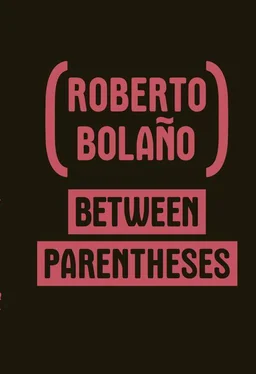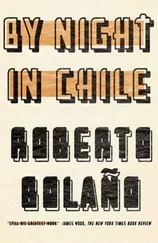Roberto Bolaño - Between Parentheses - Essays, Articles and Speeches, 1998-2003
Здесь есть возможность читать онлайн «Roberto Bolaño - Between Parentheses - Essays, Articles and Speeches, 1998-2003» весь текст электронной книги совершенно бесплатно (целиком полную версию без сокращений). В некоторых случаях можно слушать аудио, скачать через торрент в формате fb2 и присутствует краткое содержание. Год выпуска: 2011, Издательство: New Directions, Жанр: Публицистика, Критика, на английском языке. Описание произведения, (предисловие) а так же отзывы посетителей доступны на портале библиотеки ЛибКат.
- Название:Between Parentheses: Essays, Articles and Speeches, 1998-2003
- Автор:
- Издательство:New Directions
- Жанр:
- Год:2011
- ISBN:нет данных
- Рейтинг книги:4 / 5. Голосов: 1
-
Избранное:Добавить в избранное
- Отзывы:
-
Ваша оценка:
- 80
- 1
- 2
- 3
- 4
- 5
Between Parentheses: Essays, Articles and Speeches, 1998-2003: краткое содержание, описание и аннотация
Предлагаем к чтению аннотацию, описание, краткое содержание или предисловие (зависит от того, что написал сам автор книги «Between Parentheses: Essays, Articles and Speeches, 1998-2003»). Если вы не нашли необходимую информацию о книге — напишите в комментариях, мы постараемся отыскать её.
The Savage Detectives
Between Parenthese
Between Parentheses: Essays, Articles and Speeches, 1998-2003 — читать онлайн бесплатно полную книгу (весь текст) целиком
Ниже представлен текст книги, разбитый по страницам. Система сохранения места последней прочитанной страницы, позволяет с удобством читать онлайн бесплатно книгу «Between Parentheses: Essays, Articles and Speeches, 1998-2003», без необходимости каждый раз заново искать на чём Вы остановились. Поставьте закладку, и сможете в любой момент перейти на страницу, на которой закончили чтение.
Интервал:
Закладка:
Bomarzo
During the first half of the twentieth century, in Buenos Aires, there lived a generation of writers of the stature of Roberto Arlt, Ernesto Sábato, Julio Cortázar, Adolfo Bioy Casares, José Bianco, Eduardo Mallea, Jorges Luis Borges. Some learned their craft under the tutelage of Macedonio Fernández. As if that weren’t enough, one day Witold Gombrowicz came to Argentina and decided to stay. To this diverse group belonged Manuel Mujica Láinez, at first glance the least professional of them all, in the sense that it’s hard for us to imagine Mujica Láinez as a writer living for the sake of literature and making a living from literature. It’s easier to see him as a man of independent means who devotes his free time, of which he has very little, to writing novels with the sole ambition that they be read by his wide circle of friends. And yet Mujica Láinez was perhaps the most prolific Argentine novelist of his day. Not the most ambitious or the most seminal (roles probably reserved for Cortázar or Sábato), or the closest to Argentine reality (a role assigned to Arlt, Cortázar, Sábato, or Bioy, depending on the degree of madness), or the most forward-looking in devising literary structures that could make strides into undiscovered territory (like Borges and Cortázar), or the one who forged deepest into the mystery of language (the undisputed realm of Borges, who, it must be remembered, wasn’t just a great prose writer but also a great poet). Mujica Láinez, in this sense, was a modest figure. In fact, when viewed in the company of such exceptional writers and literary giants as Borges, Cortázar, Arlt, Bioy Casares, and Sábato, he seems to shrink and seek quiet refuge in Argentine literature, in provincial literature, but upon even the most cursory reading of his work, this impression turns out to be completely mistaken.
From the beginning, in his first novel, Don Galaz de Buenos Aires (1938), two traits became evident that would prove constant in Mujica Láinez’s life as a writer. On the one hand, there’s his exquisite command of a precise, rich, and dextrous Spanish that manages never to lapse into grandiosity or stiff formality. On the other hand, and this may be what really matters, there’s his cheerful approach to the act of writing. It’s true that he never took huge risks and that, compared to the great Latin American novelists of the twentieth century, his work is in some sense that of a minor writer. But what a wonderful minor writer! Capable of producing, for example, Misteriosa Buenos Aires , or El viaje de los siete demonios [The Voyage of the Seven Demons], or The Wandering Unicorn , or Los viajeros [The Travelers], all of them enjoyable to read, all of them modest (and rather jittery) books, like their author, and enough to assure him a place alongside other minor writers like Mallea or José Bianco.
But Mujica Láinez’s great surprise was yet to come, and that surprise is Bomarzo . Published in 1962, the novel won Argentina’s National Literature Prize and then the John F. Kennedy Prize in 1964, shared with Cortázar’s Hopscotch (or Rayuela ), which (as Marcos Ricardo Barnatán reminds us) gave Mujica the idea of publishing both novels in a joint edition under a single title, either Ramarzo or Boyuela .
My generation, it goes without saying, fell in love with Hopscotch , because it was exactly what we needed, our salvation, and we only read Bomarzo years later, almost as an exercise in archeology. Despite what we expected, we didn’t emerge unscathed, among other things because no one or almost no one can emerge unscathed from reading any book, much less if it’s the more than six hundred pages of Bomarzo , a happy novel, or a novel that will make any reader happy, and that will teach the young writer absolutely nothing. The life and adventures of the Duke of Orsini, his thousand adventures and countless mishaps and feats, are a stage for the unfolding of a kind of writing, an art of storytelling, that at once recalls the classics of the nineteenth century and introduces apocryphal luxuries of the sixteenth century, the century of the monstruous and angelic Orsini.
At first glance Bomarzo seems to be a novel of conflict, a novel of survival, a historic novel, a novel of intrigue, a bodice-ripper. It may in fact be all those things. But it’s also many other things: it’s a novel about art and a novel about decadence, it’s a novel about the luxury of writing novels and a novel about the exquisite uselessness of the novel. Between the lines, it’s also Mujica Láinez’s commentary or playful epilogue on himself and his family. And of course it’s also a novel to be read aloud, with the whole family gathered around, although in the latter case there’s always the risk that the children will flee en masse.
After Bomarzo Mujica didn’t have much left to say. He traveled frequently and in high style all over the planet. He wrote De milagros y melancolías [Of Miracles and Sorrows] and El gran teatro [The Great Theater], with what appeared to be the greatest of ease. And before he died, in 1984, at the age of seventy-four, he had time to write the 500-page novel El escarabajo [The Scarab] (1982), which tells of the vicissitudes of the possessors of an Egyptian talisman through time, and which is an intelligent, well-written work, pleasing to read (possibly pleasing to write), with measured doses of humor, suffering, and travel. A happy novel, like most of his books.
Two Small Novels by Mario Vargas Llosa
THE CUBS, AGAIN
Among the books I read in my youth, I remember four short novels written by authors who mostly wrote long novels, four novels that years later still retain all of their original explosive charge, as if after exploding on a first reading they had exploded again on a second and a third and so on, without ever being depleted. Beyond question, they are perfect works. All four are about defeats, but they turn defeat into a kind of black hole: the reader who ventures in will emerge trembling, ice-cold or dripping with sweat. They are perfect and they are caustic. They are precise: the hand that wields the pen is that of a neurosurgeon. And they are also a celebration of movement: the speed at which they move was something unprecedented at the time in Spanish-language literature. These novels are García Márquez’s No One Writes to the Colonel , Julio Cortázar’s The Pursuer , José Donoso’s Hell Has No Limits , and Vargas Llosa’s The Cubs .
I don’t think it’s a coincidence that the four authors knew each other and were friends, that each kept a curious eye on what the others were writing, and that these four books were written, if I’m not mistaken, in the 1960s (though The Pursuer may date from the 1950s), a prodigious decade for Latin Americans, with all the good and bad implied by that adjective.
From these four novels (if their authors had written nothing else, which isn’t the case), one could create a literature. Of the four, The Cubs is probably the most caustic, the most fiendishly paced, and the one in which the voices — the multiplicity of forms of speech — are most alive. It’s also the most complicated, at least from a formal perspective. The first version was written in 1965, that is, when Vargas Llosa was twenty-nine, the youngest of the Boom authors; the definitive version dates from 1966 and was originally published by Lumen with photographs by Xavier Miserachs. On the surface, The Cubs couldn’t be simpler. In a variety of voices, from a variety of angles (one is tempted to say torsions , maneuvers performed by the writer that often become practical and masterful demonstrations of the many things that can be done with the Spanish language), it tells the story of the life of P. P. Cuéllar, an upper-middle-class boy from Lima, and the story is told in the voices of his childhood friends, boys like P. P. Cuéllar, residents or citizens of the Lima neighborhood of Miraflores, a place that leaves its stamp on these future lords of Peru.
Читать дальшеИнтервал:
Закладка:
Похожие книги на «Between Parentheses: Essays, Articles and Speeches, 1998-2003»
Представляем Вашему вниманию похожие книги на «Between Parentheses: Essays, Articles and Speeches, 1998-2003» списком для выбора. Мы отобрали схожую по названию и смыслу литературу в надежде предоставить читателям больше вариантов отыскать новые, интересные, ещё непрочитанные произведения.
Обсуждение, отзывы о книге «Between Parentheses: Essays, Articles and Speeches, 1998-2003» и просто собственные мнения читателей. Оставьте ваши комментарии, напишите, что Вы думаете о произведении, его смысле или главных героях. Укажите что конкретно понравилось, а что нет, и почему Вы так считаете.












